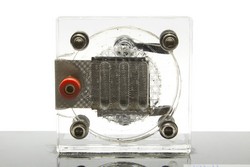Novel technology for portable power systems
As an alternative to traditional energy vectors based on fossil fuels, hydrogen has great potential for clean, efficient power in stationary, portable and transport applications. However, there are still significant barriers to overcome before it can become the energy solution of the future. These are related to the difficulty in storing and transporting it, especially for portable applications. In the EU-funded project BEINGENERGY (Integrated low temperature methanol steam reforming and high temperature polymer electrolyte membrane fuel cell), scientists unveiled a fuel cell power supply prototype with improved performance over similar technologies. The new integrated solution includes a methanol reformer and a high-temperature polymer electrolyte membrane fuel cell (HT-PEMFC). Scientists' target was to perform the methanol steam reforming reaction at temperatures below 200 °C. Low-temperature methanol conversion to hydrogen simplifies coupled operation since the highly exothermic reaction by the HT-PEMFC supplies heat to the endothermic steam reforming reaction. As a result, coupling of the HT-PEMFC and the methanol reformer improved efficiency of the resulting fuel cell by almost 14 %. The integrated system is compact and easy to use, exceeding targets set by the European Commission's Fuel Cells and Hydrogen Joint Undertaking (FCH JU) programme. Due to the catalyst characteristics and the low-operation temperature, the reformer produces reduced carbon monoxide emissions, which increases fuel cell performance and lifetime. The team identified two very promising catalysts based on copper and palladium for more efficient production of hydrogen. Both can be applied in different methanol reformer configurations. Unlike conventional tubular methanol steam reformers, the new reformer was designed in a way that enables heat transfer to be uniform across the packed bed. BEINGENERGY's advanced technology can boost European leadership in the development and commercialisation of small and medium fuel cell power supplies. Project findings may also have an impact on other industries that depend on efficient and cost-effective energy and storage technologies, such as in electric vehicles.
Keywords
Hydrogen, BEINGENERGY, methanol steam reforming, fuel cell power supply, polymer electrolyte membrane fuel cell

